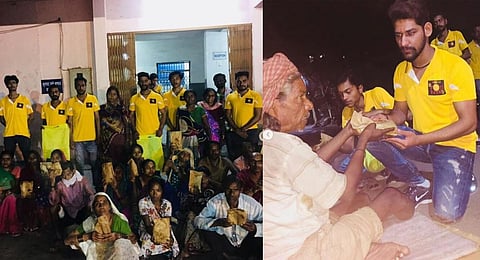

LUCKNOW: An encounter with an old hungry woman outside the Lucknow railway station seven years ago inspired the concept of the 'Indian Roti Bank' (IRB), which has now spread to 14 states and even crossed the international boundary to countries like Nepal and Nigeria.
The man behind the initiative, Vikram Pandey of Hardoi, said his slogan was 'Bhukha Na Soye Koi (Nobody sleeps empty stomach)-Roti Bank Hardoi'.
The 38-year-old Lucknow University graduate celebrated the seventh foundation day of the IRB on February 5.
In a conversation with PTI, Pandey recalled, "About seven years ago, a woman was begging outside the Lucknow railway station. I did not pay attention to her initially, but she started crying saying she was hungry. So I took her to a food cart, where she ate six to seven 'puris'. She was really very hungry. That day I was travelling to Delhi and on the way, I kept thinking about that woman. On returning from Delhi, I started feeding the hungry with help from some of my friends on February 6, 2016. This led to the establishment of the Indian Roti Bank."
Pandey said initially, some local officials encouraged him and then with the help of his friends, he started distributing 'rotis' to the hungry.
People kept joining the campaign and after some time, Roti Bank Farrukhabad was started with the slogan 'Khao Piyo, Raho Aabad-Roti Bank Farrukhabad", he said. The movement then continued to grow.
Pandey said the IRB now has branches in more than 100 districts in 14 states and has been successful in providing food to about 12 lakh people.
During the COVID-19 pandemic, IRB volunteers showed their commitment to providing food to the people and it was greatly appreciated, he added.
"My dream is to open a unit of Roti Bank in every district of India. We have more than 100 units working in the country now," Pandey said.
Talking about how the IRB works, he said volunteers collect rotis from families and prepare the vegetables, and pack four rotis with a portion of the vegetables, pickles and chilly. These packets are then distributed to beggars and the hungry and needy at railway stations, bus stations, and public places, Pandey added.
Volunteers distribute these roti packets on cycles, motorcycles and vehicles. Mohit Sharma, a resident of Jiamau and coordinator of the Indian Roti Bank Lucknow, told PTI that on average, volunteers collect 300 rotis from 50-60 families here and make packets and distribute them.
Pandey said IRB teams operating across the country receive more than 50,000 rotis from people every week on average.
People also give rice and other food items, he added. Garima Rastogi, who coordinates women workers of the IRB in Lucknow, said volunteers also take care that the food they collect are fresh and fit to be consumed.
"We also collect untouched excess food from functions and distribute it to the needy," she added.
Pandey, who is also active in the Congress party, has made the campaign to distribute bread among the poor the biggest goal of his life.
His father Shailesh Pandey is an advocate in Hardoi and his mother a homemaker. He said the organisation runs solely on public cooperation.
"I do not take any cooperation of even a single rupee from the government or the administration, nor do I take donations or grants," Pandey said.
He said Indian Roti Bank operates its network through WhatsApp and the group has also started the movement in Nigeria and Nepal.
In the last seven years, many people joined Indian Roti Bank.
Ballia's Ram Badan Choubey, who was once the IRB's Uttar Pradesh coordinator, told PTI that he was associated with the IRB earlier but after leaving the organisation, he continues to provide food to the hungry in Ballia.
Vikram Pandey claimed many people join IRB out of enthusiasm and then leave after tasting success.
Many IRB workers became corporators only by distributing rotis and then left the campaign, he added.